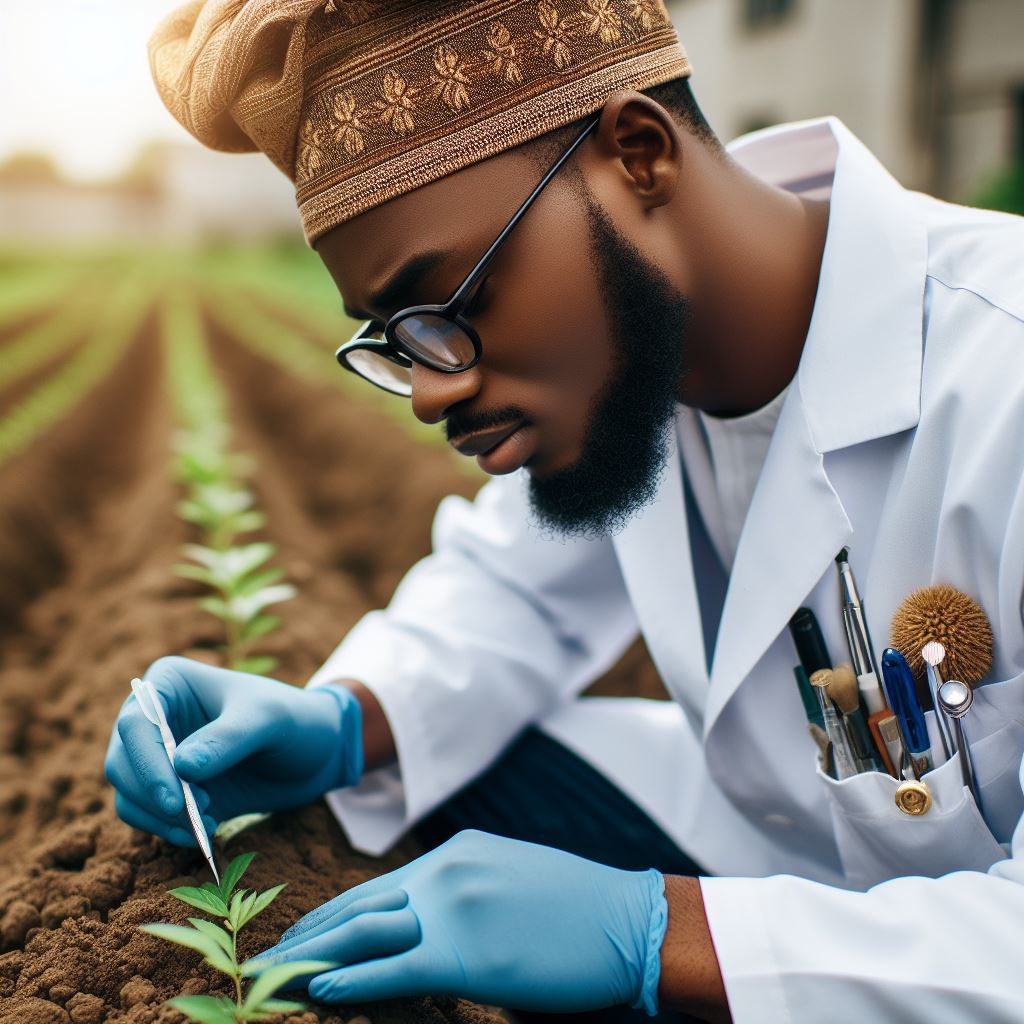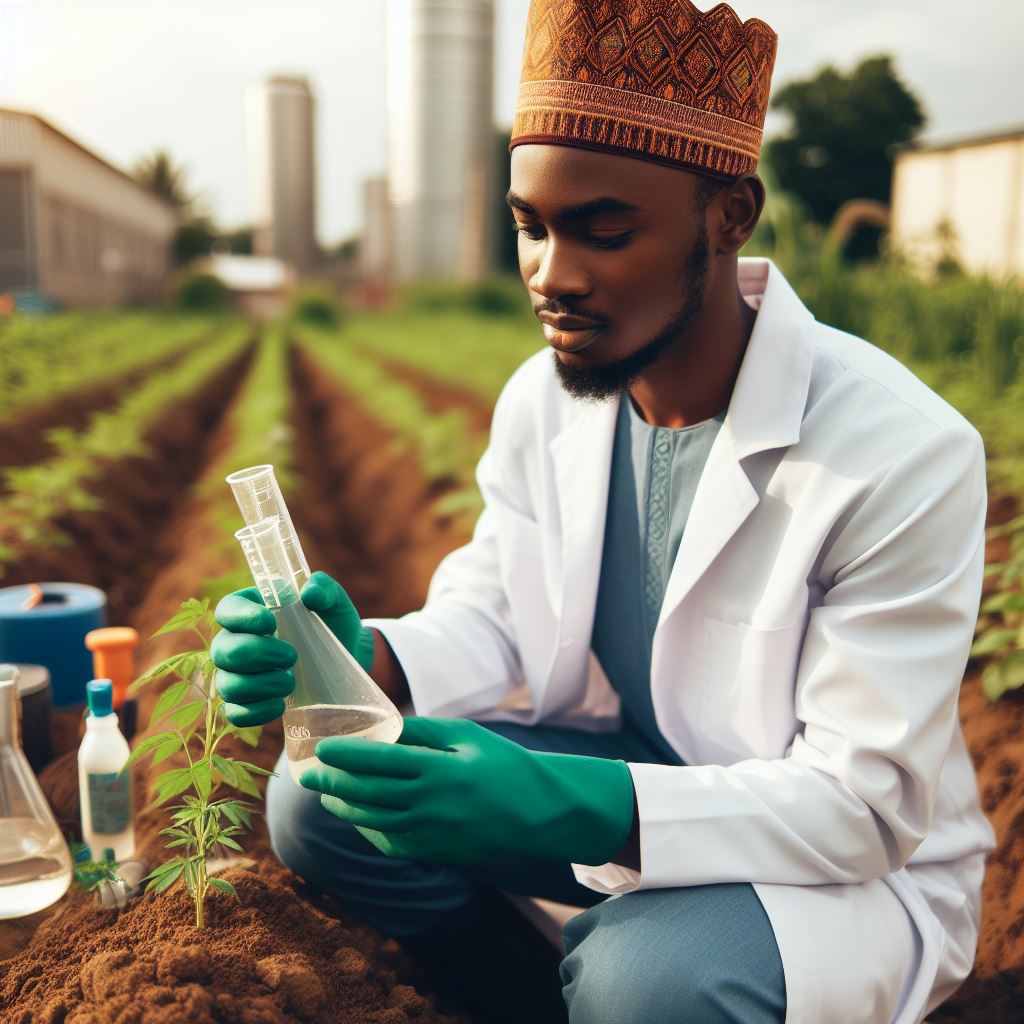Introduction
Postgraduate opportunities in Crop & Soil Science in Nigeria are essential for the country’s agricultural development.
Crop & Soil Science plays a crucial role in ensuring food security, sustainable agriculture, and environmental preservation.
Crop & Soil Science involves the study of plants, their growth, and the soil in which they thrive.
It helps in understanding the best farming practices, improving crop yields, and developing strategies for soil conservation and remediation.
Nigeria heavily relies on agriculture for its economy, with the majority of the population involved in farming.
Crop & Soil Science provides valuable knowledge and techniques to farmers, allowing them to optimize their crop production and productivity.
Postgraduate opportunities in this field offer advanced training and research opportunities for individuals passionate about agricultural sciences.
These opportunities equip students with the skills and knowledge necessary to address pressing issues in crop production and soil management.
Through postgraduate studies, students can specialize in areas such as plant genetics, agronomy, soil chemistry, and precision agriculture.
They can contribute to research and find innovative solutions to challenges faced by the agricultural sector in Nigeria.
Postgraduates in Crop & Soil Science can pursue various career paths.
They can work as agricultural consultants, researchers, educators, or even start their own agricultural ventures.
Their expertise is highly sought after, both in the public and private sectors, as Nigeria continues to prioritize agricultural development.
In essence, postgraduate opportunities in Crop & Soil Science in Nigeria are vital for the country’s agricultural growth, sustainability, and food security.
These opportunities enable individuals to acquire advanced knowledge and skills, ultimately contributing to the development of the agricultural sector and the overall welfare of the nation.
Jobs and Career Prospects in Crop & Soil Science
Various Job Opportunities for Postgraduates in Crop & Soil Science
- Research positions in agricultural institutions and universities provide opportunities for cutting-edge scientific work.
- Government positions related to agriculture and food security allow postgraduates to contribute to policymaking and implementation.
- Consulting roles in agricultural companies and organizations offer opportunities to provide expert advice and drive innovation.
- Teaching positions in academic institutions enable postgraduates to share their knowledge and mentor future professionals.
Potential Career Growth and Salary Prospects
Postgraduates in Crop & Soil Science can expect promising career growth in various professional domains:
- Research positions can lead to becoming principal investigators or project leaders, managing research teams and securing grants.
- In government positions, postgraduates can advance to managerial roles, shaping agricultural policies and leading initiatives.
- Consulting roles offer opportunities to become senior consultants or partners, working on high-profile projects and earning lucrative salaries.
- Teaching positions can lead to becoming department heads or professors, contributing to academia and guiding future generations.
Career growth often correlates with salary prospects. Here’s an overview of the earning potential in these positions:
- Research positions: Depending on experience and responsibilities, salaries range from $50,000 to $120,000 per year.
- Government positions: Postgraduates can earn between $40,000 and $100,000 annually, with opportunities for additional benefits and promotions.
- Consulting roles: Salaries in agricultural consulting can vary widely, but experienced postgraduates can earn $80,000 to $150,000 per year.
- Teaching positions: Starting salaries for postgraduates often range from $40,000 to $60,000 per year, with potential increases over time.
It is important to note that these salary ranges are approximate and can vary based on factors such as location, experience, and organizational level.
Additional benefits, such as healthcare and retirement plans, are also commonly provided in these positions.
Postgraduate opportunities in Crop & Soil Science offer a diverse range of job prospects and potential for growth.
Whether you pursue research, government roles, consulting, or teaching, there are multiple avenues to make a significant impact in the agricultural sector while enjoying rewarding careers and competitive salaries.
Read: The Interplay Between Soil Health & Crop Protection in Nigeria
Master’s Programs in Crop & Soil Science
Overview of Master’s Programs
There are several Master’s programs available in Crop & Soil Science that provide students with in-depth knowledge and specialized skills in the field.
These programs are offered by various universities and institutions in Nigeria.
1. Universities Offering Master’s Programs
Some of the universities and institutions in Nigeria offering Master’s programs in Crop & Soil Science are:
- University of Ibadan
- Ahmadu Bello University
- University of Ilorin
- Federal University of Agriculture, Abeokuta
- University of Nigeria, Nsukka
2. Admission Requirements and Application Processes
The admission requirements for Master’s programs in Crop & Soil Science typically include a minimum of a Bachelor’s degree in a related field, such as Agriculture or Environmental Science.
Some universities may also require a certain minimum GPA.
To apply for these programs, prospective students usually need to submit an application form, academic transcripts, letters of recommendation, and a statement of purpose.
Some universities may also require applicants to pass an entrance examination or an interview.
3. Curriculum and Coursework
The curriculum of Master’s programs in Crop & Soil Science generally includes a combination of core courses, electives, and research work.
The coursework covers various aspects of crop and soil sciences, such as soil fertility, crop production, soil conservation, and plant pathology.
Students may also have the opportunity to specialize in specific areas within Crop & Soil Science, such as agroecology, plant breeding, or soil microbiology.
The programs often involve laboratory work, field research, and seminars to enhance practical skills and knowledge.
Benefits of Pursuing a Master’s Degree
There are several benefits to pursuing a Master’s degree in Crop & Soil Science:
1. Opportunities for Specialization
A Master’s degree allows students to specialize in specific areas of Crop & Soil Science, enabling them to develop expertise and in-depth knowledge in their chosen field.
This specialization opens up further opportunities for research and career advancement.
2. Career Prospects
Having a Master’s degree in Crop & Soil Science can significantly improve job prospects and career advancement opportunities.
Graduates can find employment in various sectors, such as agricultural research organizations, government agencies, agribusiness companies, and international development organizations.
3. Contribution to Agricultural Development
By pursuing a Master’s degree in Crop & Soil Science, individuals contribute to agricultural development and food security in Nigeria.
They acquire the skills and knowledge needed to address challenges in crop production, soil management, and sustainable agriculture, thus playing a vital role in ensuring a sustainable and efficient agricultural system.
Transform Your Career with Expert Guidance
Get personalized mentorship consulting that’s tailored to your unique path. Our expert advice is actionable and exclusive.
Get StartedIn fact, there are several Master’s programs available in Crop & Soil Science in Nigeria, offered by universities and institutions.
These programs provide students with specialized knowledge, better job prospects, and opportunities to contribute to agricultural development in the country.
Read: Scholarships & Funding: Studying Crop Protection in Nigeria

PhD Programs in Crop & Soil Science
Pursuing a PhD in Crop & Soil Science can be a rewarding and fulfilling educational path.
This section will explore the significance and benefits of pursuing a PhD in this field, as well as the admission requirements, application processes, and potential funding sources and scholarships available for PhD candidates.
Significance and Benefits of Pursuing a PhD in Crop & Soil Science
1. Research opportunities and contributions to the field
Pursuing a PhD in Crop & Soil Science allows students to engage in cutting-edge research, explore new theories, and make significant contributions to the field.
Through research projects, students have the opportunity to generate new knowledge and advancements that can benefit agriculture and society as a whole.
2. Enhanced prospects for academic and research careers
A PhD in Crop & Soil Science opens doors to a wide range of career opportunities.
Graduates with a doctoral degree are highly sought after in academia, research institutions, and government agencies.
They can pursue teaching and research positions, working on innovative projects and guiding the next generation of agricultural professionals.
3. Potential for leadership roles in agricultural institutions
PhD holders in Crop & Soil Science possess the expertise and knowledge required to take up leadership positions in agricultural institutions.
They can become influential decision-makers, shaping policies, strategies, and practices in the agricultural industry.
Their research and expertise can drive improvements and advancements in crop production, soil conservation, and sustainable agricultural practices.
Admission Requirements and Application Processes for PhD Programs in Crop & Soil Science
Prospective students interested in pursuing a PhD in Crop & Soil Science should research universities or institutions in Nigeria that offer such programs.
Each institution may have specific admission requirements and application processes that need to be followed.
It is essential to carefully review the guidelines provided by each institution.
Potential Funding Sources and Scholarships Available for PhD Candidates
1. National Research Council (NRC) scholarships
The National Research Council of Nigeria offers scholarships specifically for PhD candidates in Crop & Soil Science.
These scholarships provide financial support to cover tuition fees, research expenses, and living costs.
2. Government grants
The Nigerian Government provides grants to support research projects related to Crop & Soil Science.
PhD candidates can apply for these grants to fund their research work, purchase necessary equipment or materials, and cover travel expenses for fieldwork.
3. University funding opportunities
Many universities have their own funding programs, such as research assistantships or fellowships, for PhD candidates in Crop & Soil Science.
These opportunities may provide financial support in the form of stipends or tuition waivers.
4. Private organizations and foundations
Private organizations and foundations interested in promoting agricultural research and development may offer scholarships and grants specifically for PhD candidates in Crop & Soil Science.
Students should research and explore these external funding opportunities to support their PhD studies.
In short, pursuing a PhD in Crop & Soil Science can lead to various benefits, including research opportunities, improved career prospects, and the potential for leadership roles in agricultural institutions.
Prospective students should carefully review the admission requirements and application processes of specific universities or institutions offering PhD programs.
Additionally, they should explore potential funding sources and scholarships available, such as those provided by the National Research Council, the Nigerian Government, universities, and private organizations.
Read: Modern Tools & Techniques in Nigerian Agronomy
Success Stories and Testimonials
Success stories of individuals who have pursued postgraduate opportunities in Crop & Soil Science
The success stories and testimonials of individuals who have pursued postgraduate opportunities in Crop & Soil Science serve as inspirational examples of the impact and potential within this field.
From groundbreaking research to innovative techniques, these individuals have made significant contributions to the industry.
Dr. Emily Anderson’s development of sustainable farming techniques showcases how postgraduates can positively influence crop yields and contribute to food security.
Through her dedication and research, Anderson’s achievements have revolutionized the farming sector.
John Davis’s work on soil erosion prevention methods demonstrates the practical application of research conducted by postgraduates.
His findings have been essential in implementing measures that protect soil health and maintain agricultural productivity.
Prof. Sarah Johnson’s contributions to the field of soil fertility management have had wide-ranging impacts.
Her research has influenced agricultural practices worldwide and has led to sustainable agricultural systems that prioritize soil health and long-term productivity.
Testimonials from current or past postgraduate students in Crop & Soil Science programs
The testimonials of current and past postgraduate students in Crop & Soil Science programs offer insights into the students’ personal experiences, challenges faced, and ultimate successes.
Sara Thompson emphasizes the promising research opportunities and career prospects provided by studying Crop & Soil Science.
Michael Roberts highlights the importance of collaboration and mentorship in overcoming challenges faced in postgraduate programs.
By engaging with fellow researchers and mentors, students can develop effective solutions to complex agricultural problems.
Alexander Lee’s testimonial underscores the critical thinking and problem-solving skills fostered by Crop & Soil Science programs.
These skills are essential in addressing the complex and evolving challenges within the field.
Overall, the success stories and testimonials presented here provide a glimpse into the remarkable achievements of individuals who have pursued postgraduate opportunities in Crop & Soil Science.
This field offers immense potential for those passionate about improving agricultural practices, fostering sustainability, and contributing to global food security.
Read: Role of Soil Science in Nigeria’s Food Security
Conclusion
The significance of postgraduate opportunities in Crop & Soil Science cannot be overstated.
These programs are the cornerstone of innovation, sustainability, and advancement in agricultural practices.
Pursuing higher studies in this field unlocks a realm of possibilities, contributing to global food security and environmental conservation.
The relevance of postgraduate studies lies in their direct impact on addressing pressing agricultural challenges.
Advanced research equips individuals with the skills to enhance crop yields, mitigate soil degradation, and develop resilient farming techniques.
These studies are crucial for sustainable agricultural practices in the face of climate change.
I strongly encourage aspiring scholars and professionals to consider delving deeper into this field.
The pursuit of postgraduate studies offers a profound chance to specialize, innovate, and lead transformative changes.
By immersing oneself in rigorous academic exploration, one gains the expertise needed to pioneer breakthroughs that benefit society and the planet.
For those keen on exploring postgraduate programs in Crop & Soil Science in Nigeria, various resources and links exist to aid your journey.
Institutions like the Federal University of Agriculture, Abeokuta, and Ahmadu Bello University offer esteemed programs.
Additionally, governmental bodies like the Nigerian Institute of Soil Science provide valuable information and support for prospective students.
Moreover, online platforms such as the Nigeria Higher Education Foundation (NHEF) and the National Universities Commission (NUC) website furnish comprehensive insights into available programs, admission criteria, and scholarship opportunities.
These resources empower individuals with the necessary information to make informed decisions about their academic pursuits.
Embracing postgraduate opportunities in Crop & Soil Science is a transformative step toward shaping a sustainable future.
Aspiring minds should harness these possibilities, contribute to agricultural advancement, and pave the way for a thriving and resilient agricultural sector in Nigeria.




